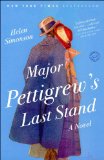Summary | Excerpt | Reading Guide | Discuss | Reviews | Beyond the Book | Readalikes | Genres & Themes | Author Bio

A Novel
by Helen Simonson
When Mr. Ali died, everyone had been appropriately upset. The village council, on which the Major sat, had debated a memorial service of some kind, and when that fell through (neither the parish church nor the pub being suitable) they had sent a very large wreath to the funeral home.
“I am sorry I did not have an opportunity to meet your lovely wife,” said Mrs. Ali, handing him a cup.
“Yes, she’s been gone some six years now,” he said. “Funny really, it seems like both an eternity and the blink of an eye all at the same time.”
“It is very dislocating,” she said. Her crisp enunciation, so lacking among many of his village neighbors, struck him with the purity of a well-tuned bell. “Sometimes my husband feels as close to me as you are now, and sometimes I am quite alone in the universe,” she added.
“You have family, of course.”
“Yes, quite an extended family.” He detected a dryness in her tone. “But it is not the same as the infinite bond between a husband and wife.”
“You express it perfectly,” he said. They drank their tea and he felt a sense of wonder that Mrs. Ali, out of the context of her shop and in the strange setting of his own living room, should be revealed as a woman of such great understanding. “About the housecoat,” he said.
“Housecoat?”
“The thing I was wearing.” He nodded to where it now lay in a basket of National Geographics. “It was my wife’s favorite housecleaning attire. Sometimes I, well...”
“I have an old tweed jacket that my husband used to wear,” she said softly. “Sometimes I put it on and take a walk around my garden. And sometimes I put his pipe in my mouth to taste the bitterness of his tobacco.” She flushed a warmer shade and lowered her deep brown eyes to the floor, as if she had said too much. The Major noticed the smoothness of her skin and the strong lines of her face.
“I still have some of my wife’s clothes, too,” said the Major. “After six years, I don’t know if they still smell of her perfume or whether I just imagine it.” He wanted to tell her how he sometimes opened the closet door to thrust his face against the nubby suits and the smooth chiffon blouses. Mrs. Ali looked up at him and behind her heavy-lidded eyes he thought she too might be thinking of such absurd things.
“Are you ready for more tea?” she asked and held out her hand for his cup.
When Mrs. Ali had left, she making her excuses for having invited herself into his home and he making his apologies for inconveniencing her with his dizzy spell, the Major donned his housecoat once more and went back to the small scullery beyond the kitchen to finish cleaning his gun. He was conscious of tightness around his head and a slight burn in the throat. This was the dull ache of grief in the real world; more dyspepsia than passion.
He had left a small china cup of mineral oil warming on its candle stand. He dipped his fingers in the hot oil and began to rub it slowly into the burled walnut root of the gun stock. The wood became silk under his fingertips. He relaxed into his task and felt his grief ease, making room for the tiniest flowering of a new curiosity.
Mrs. Ali was, he half suspected, an educated woman, a person of culture. Nancy had been such a rare person, too, fond of her books and of little chamber concerts in village churches. But she had left him alone to endure the blunt tweedy concerns of the other women of their acquaintance. Women who talked horses and raffles at the hunt ball and who delighted in clucking over which unreliable young mother from the council cottages had messed up arrangements for this week’s play group at the Village Hall. Mrs. Ali was more like Nancy. She was a butterfly to their scuffle of pigeons. He acknowledged a notion that he might wish to see Mrs. Ali again outside of the shop, and wondered whether this might be proof that he was not as ossified as his sixty-eight years, and the limited opportunities of village life, might suggest.
Excerpted from Major Pettigrew's Last Stand by Helen Simonson Copyright © 2010 by Helen Simonson. Excerpted by permission of Random House, a division of Random House, Inc. All rights reserved. No part of this excerpt may be reproduced or reprinted without permission in writing from the publisher.
Knowledge is of two kinds. We know a subject ourselves, or we know where we can find information on it.
Click Here to find out who said this, as well as discovering other famous literary quotes!
Your guide toexceptional books
BookBrowse seeks out and recommends the best in contemporary fiction and nonfiction—books that not only engage and entertain but also deepen our understanding of ourselves and the world around us.